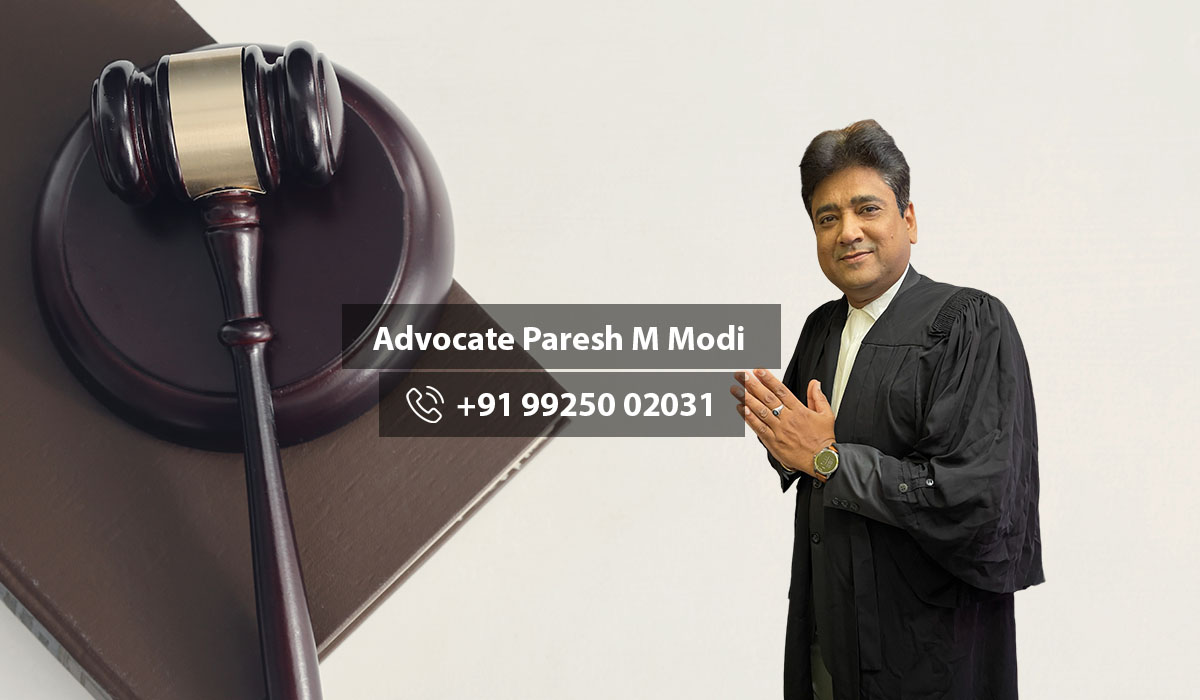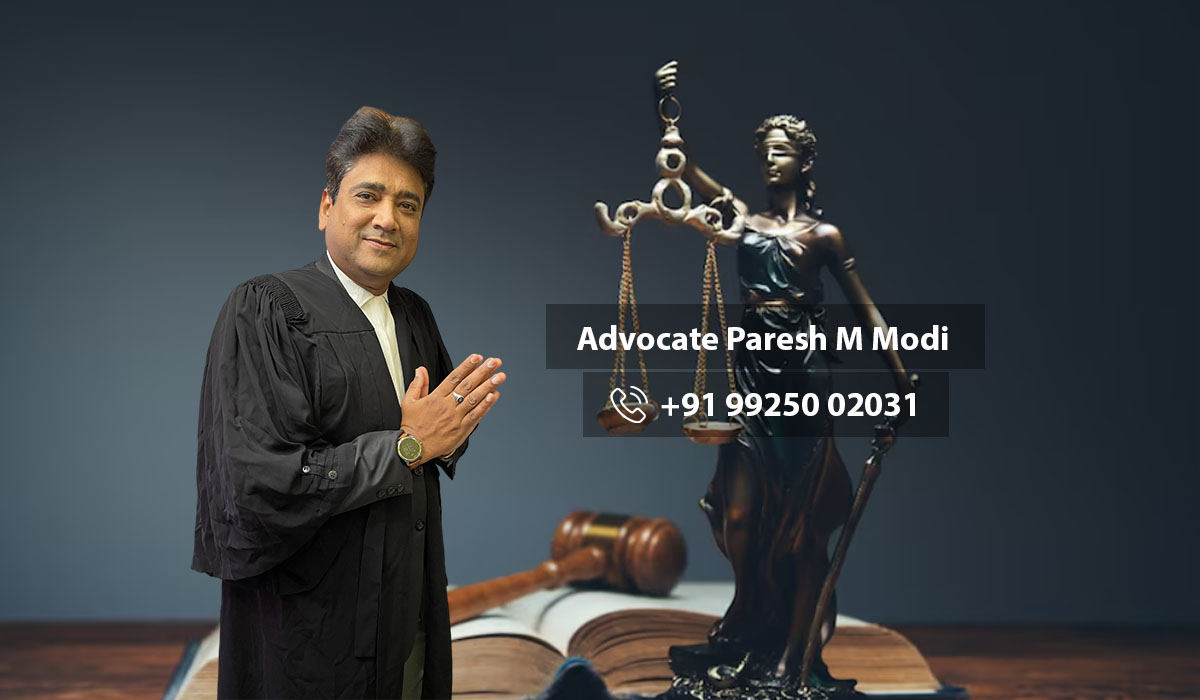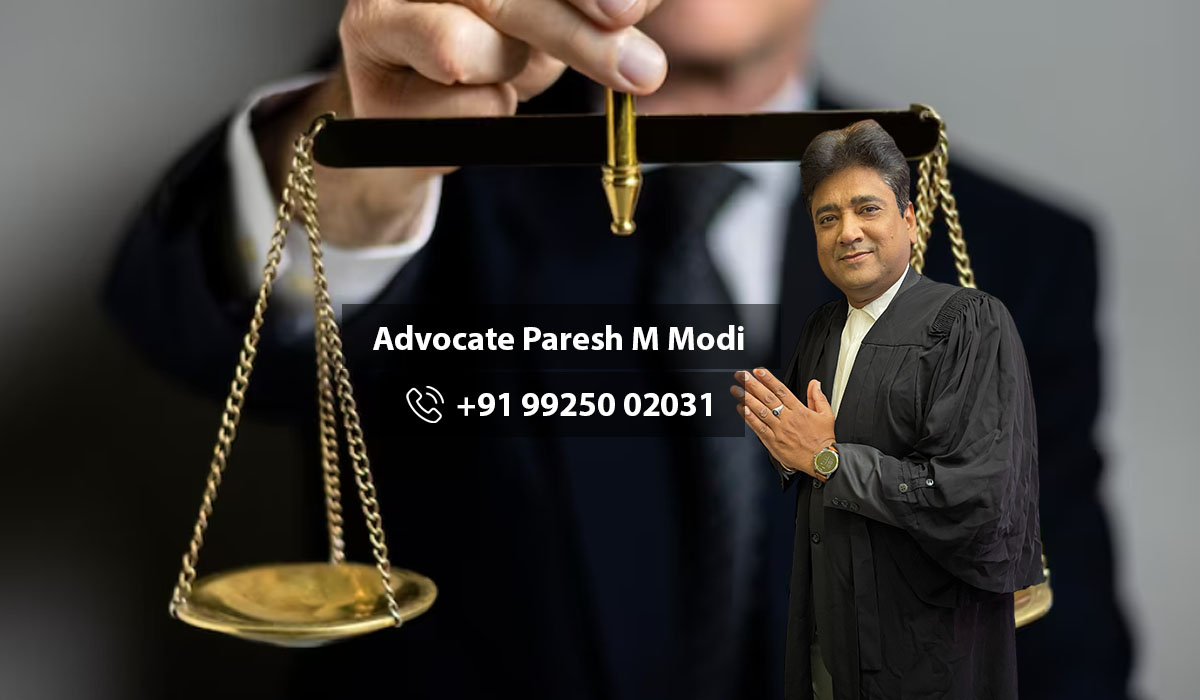The Scheduled Castes and the Scheduled Tribes (Prevention of Atrocities) Act, 1989 – Complete Details
Advocate Paresh M Modi, a reputed criminal lawyer in Ahmedabad, Gujarat, specializes in Atrocity Act cases. This webpage provides a comprehensive understanding of The Scheduled Castes and the Scheduled Tribes (Prevention of Atrocities) Act, 1989, commonly known as the Atrocity Act, including its key provisions, sections, penalties, legal procedures, witnesses’ requirements, defenses for the accused, and other legal aspects.
Introduction to the Atrocity Act, 1989
The SC/ST (Prevention of Atrocities) Act, 1989, was enacted to prevent offenses against Scheduled Castes (SC) and Scheduled Tribes (ST) and provide them protection and justice against discrimination, violence, and exploitation.
This Act aims to:
✔️ Prevent atrocities against SC/ST communities.
✔️ Ensure punishment for offenders committing caste-based crimes.
✔️ Provide relief and rehabilitation to victims.
✔️ Set up special courts for speedy trials.
This law is further strengthened by The Scheduled Castes and the Scheduled Tribes (Prevention of Atrocities) Amendment Act, 2015, which increased the list of offenses and enhanced penalties.
Key Sections of the Atrocity Act & Punishments
1. Offenses under the Act and Punishments
| Section | Offense Description | Punishment |
|---|
| Section 3(1) | Committing various atrocities against SC/ST individuals, such as forcing them to drink/eat inedible substances, removing clothes, parading naked, or wrongfully dispossessing them of land. | Minimum 6 months to Maximum 5 years imprisonment and fine |
| Section 3(2)(i) | Giving false evidence to convict an innocent SC/ST person, leading to the death penalty or life imprisonment. | Same punishment as prescribed for the offense |
| Section 3(2)(ii) | Giving false evidence to wrongly convict an SC/ST person for an offense punishable with 7+ years of imprisonment. | Minimum 6 months to Maximum 7 years imprisonment |
| Section 3(2)(iii) | Causing hurt to an SC/ST person in police custody. | Minimum 6 months to Maximum 7 years imprisonment |
| Section 3(2)(v) | Committing any offense under IPC punishable with 10+ years imprisonment against SC/ST persons because of their caste. | Life imprisonment and fine |
| Section 3(2)(va) | Any criminal offense under IPC committed against SC/ST persons due to caste identity. | Punishment as per IPC + fine |
| Section 3(3) | Preventing SC/ST persons from using public places. | Minimum 6 months to Maximum 5 years imprisonment and fine |
| Section 3(4) | Boycotting SC/ST persons socially or economically. | Minimum 6 months to Maximum 5 years imprisonment and fine |
| Section 3(5) | Preventing SC/ST persons from voting or filing nominations in elections. | Minimum 6 months to Maximum 5 years imprisonment and fine |
| Section 3(6) | Compelling an SC/ST woman for prostitution. | Minimum 10 years to life imprisonment and fine |
| Section 3(7) | Attempting to humiliate an SC/ST person. | Minimum 6 months to Maximum 5 years imprisonment and fine |
| Section 4 | Public servants neglecting their duty to prevent atrocities. | Minimum 6 months to Maximum 1 year imprisonment |
Special Provisions in the Act
✔️ Non-Bailable – Atrocity Act offenses are non-bailable, meaning the accused cannot get bail easily.
✔️ Strict Bail Conditions – As per Section 18 & 18A, anticipatory bail is not allowed for offenses under this Act.
✔️ Special Courts – Trials under this Act take place in designated Special Courts for speedy disposal.
✔️ Witness & Victim Protection – The Act provides security to witnesses and victims to prevent coercion.
Requirement of Witnesses in Atrocity Cases
✔️ Direct Witnesses – Someone who saw the crime happen.
✔️ Circumstantial Witnesses – Someone who knows the background of the offense.
✔️ Victim Statement – The victim’s FIR and testimony hold significant weight.
✔️ Medical Reports – If applicable, injury reports help prove physical harm.
✔️ Electronic Evidence – Videos, call recordings, and messages can strengthen the case.
Defenses Available for the Accused
1️⃣ False Allegation Defense – Proving that the case is motivated by personal revenge or property disputes.
2️⃣ Absence of Intent – If no caste-based discrimination was involved, the accused can claim innocence.
3️⃣ Lack of Witnesses – If the case lacks reliable witnesses, it weakens the prosecution’s claim.
4️⃣ Challenging FIR – If the FIR is filed after an unusual delay without a valid reason, it can be challenged.
5️⃣ Cross-Examination of Witnesses – The accused can prove contradictions in witness statements.
6️⃣ Anticipatory Bail in Rare Cases – If prima facie evidence is weak, bail may be granted in exceptional circumstances.
7️⃣ SC Judgment Protection – If Supreme Court precedents support the accused, they can be cited for defense.
Legal Procedure & Case Stages
1️⃣ Filing an FIR – The victim files an FIR at the police station.
2️⃣ Investigation – Police record witness statements and gather evidence.
3️⃣ Arrest & Custody – If evidence is strong, the accused is arrested.
4️⃣ Charge Sheet – Police submit the charge sheet to the Special Court.
5️⃣ Trial in Special Court – Prosecution and defense present their cases.
6️⃣ Judgment & Sentencing – The court delivers the final verdict.
7️⃣ Appeal Process – If convicted, the accused can appeal in the High Court or Supreme Court.
Why Choose Advocate Paresh M Modi for Atrocity Act Cases?
✔️ Expertise in Criminal Law – Extensive experience in SC/ST Atrocity cases.
✔️ Strong Defense Strategy – Expertise in bail applications, FIR quashing, and acquittals.
✔️ High Court & Supreme Court Representation – Handles cases at all legal levels.
✔️ Client Protection & Confidentiality – Ensures complete safety and fairness in legal proceedings.
✔️ 24/7 Legal Assistance – Available for urgent legal consultation.
Final Words
The Atrocity Act is a powerful law, and it must be used justly. If you or someone you know is involved in an SC/ST atrocity case, get expert legal help from Advocate Paresh M Modi, the best Atrocity Act lawyer in Gujarat
For legal advice on Atrocity Act cases, contact:
📞 Mobile: +91 9925002031 (WhatsApp only, 9 AM – 9 PM)
📞 Office Landline: +91-79-48001468 (10:30 AM – 6:30 PM)
✉️ Email: advocatepmmodi@gmail.com
🌐 Website: www.advocatepmmodi.in
📍 Office Address: C/112, Supath-2 Complex, Opp. Kohinoor Plaza Hotel, Near Old Wadaj Bus Stand, Ashram Road, Ahmedabad, Gujarat – 380013, India.
IN GUJARATI LANGUAGE
અત્યાચાર વિરોધી કાયદો (SC/ST Prevention of Atrocities Act, 1989) – સંપૂર્ણ માહિતી
એડવોકેટ પરેશ એમ મોદી, એક જાણીતા અપરાધી કાયદાના નિષ્ણાત, અત્યાચાર વિરોધી કાયદા (Atrocity Act)નાં કેસો હલ કરવામાં પારંગત છે. અહીં SC/ST (Prevention of Atrocities) Act, 1989 વિશે સંપૂર્ણ માહિતી આપવામાં આવી છે, જેમાં મુખ્ય કલમો, સજા, દંડ, સાક્ષીઓની આવશ્યકતા, આરોપીના સંરક્ષણ અને અન્ય કાનૂની બાબતો શામેલ છે.
અત્યાચાર વિરોધી કાયદાનું પરિચય
SC/ST (Prevention of Atrocities) Act, 1989 એ ખાસ કરીને અનુસૂચિત જાતિ (SC) અને અનુસૂચિત જનજાતિ (ST) ના નાગરિકોની સુરક્ષા અને ન્યાય સુનિશ્ચિત કરવા માટે બનાવવામાં આવ્યો છે.
આ કાયદા હેઠળ: ✔️ અત્યાચાર અને અન્યાયને રોકવા માટે કડક નિયમો બનાવવામાં આવ્યા છે.
✔️ SC/ST નાગરિકો માટે વિશેષ સુરક્ષા અને ન્યાય મેળવવાની વ્યવસ્થા કરવામાં આવી છે.
✔️ દોષિતને કડક સજા આપવામાં આવે છે.
✔️ વિશિષ્ટ કોર્ટો દ્વારા ઝડપી સુનાવણી થાય છે.
SC/ST (Prevention of Atrocities) Amendment Act, 2015 દ્વારા આ કાયદાને વધુ મજબૂત બનાવવામાં આવ્યો છે.
અત્યાચાર કાયદાની મુખ્ય કલમો અને સજાઓ
| કલમ | ગુનો | સજા |
|---|
| કલમ 3(1) | SC/ST વ્યક્તિ સામે બળાત્કાર, શારીરિક ત્રાસ, જમીન કબ્જો, જાતિવાદી અપમાન વગેરે | 6 મહિના થી 5 વર્ષની કેદ અને દંડ |
| કલમ 3(2)(i) | SC/ST વ્યક્તિને ખોટી સાક્ષી દ્વારા ફસાવવાનો પ્રયાસ, જેનાથી મોતની સજા થઈ શકે | મોતની સજા અથવા આજીવન કેદ |
| કલમ 3(2)(ii) | SC/ST વ્યક્તિને ખોટી સાક્ષી દ્વારા ફસાવવા માટે 7+ વર્ષની સજા | 6 મહિના થી 7 વર્ષની કેદ |
| કલમ 3(2)(v) | SC/ST વ્યક્તિ સામે કોઈપણ IPC હેઠળનો ગુનો, જે 10+ વર્ષની સજાને પાત્ર હોય | આજીવન કેદ અને દંડ |
| કલમ 3(4) | SC/ST વ્યક્તિનું સામાજિક અથવા આર્થિક બહિષ્કાર | 6 મહિના થી 5 વર્ષની કેદ અને દંડ |
| કલમ 3(6) | SC/ST મહિલાને દેહવ્યાપાર માટે મજબૂર કરવું | 10 વર્ષથી આજીવન કેદ અને દંડ |
| કલમ 4 | જાહેર કર્મચારી પોતાની ફરજમાં કાળજી લેવામાં નિષ્ફળ જાય | 6 મહિના થી 1 વર્ષની કેદ |
કાયદાની વિશેષ જોગવાઇઓ
✔️ બિનજામીનપાત્ર ગુનાઓ – આ કાયદા હેઠળ આરોપી સરળતાથી જામીન મેળવી શકતો નથી.
✔️ જામીન પર કડક શરતો – કલમ 18 અને 18A હેઠળ, આગોતરી જામીન મળવાની શક્યતા નથી.
✔️ વિશિષ્ટ કોર્ટમાં કેસની સુનાવણી – અત્યાચાર કાયદા હેઠળ વિશેષ અદાલતો દ્વારા ઝડપી ન્યાય અપાય છે.
✔️ સાક્ષી અને પીડિત રક્ષણ – પીડિત અને સાક્ષીઓને સનરક્ષણ અપાય છે.
SC/ST અત્યાચાર કેસમાં સાક્ષીઓની આવશ્યકતા
✔️ સજીવ સાક્ષી (Direct Witness) – જેમણે ઘટનાને પોતાની આંખે જોઈ હોય.
✔️ પરીસ્થિતિજ સાક્ષી (Circumstantial Witness) – જેવી કે, પીડિત પર અગાઉના હુમલા, ગાંસડી દસ્તાવેજો.
✔️ ફિરયાદીનું નિવેદન – પીડિત વ્યક્તિનું FIR અને કોર્ટમાં આપેલું નિવેદન મહત્વપૂર્ણ સાબિત થાય છે.
✔️ ચિકિત્સા અહેવાલ (Medical Reports) – જખમ અથવા હુમલાના પુરાવા.
✔️ ઇલેક્ટ્રોનિક પુરાવા (Electronic Evidence) – વિડીયો, ઑડિયો રેકોર્ડિંગ, WhatsApp મેસેજ વગેરે.
આરોપી માટે કાનૂની સંરક્ષણ (Defences for the Accused)
1️⃣ ખોટા આરોપનો બચાવ – વ્યક્તિએ ખોટા આરોપ મૂક્યા છે તે સાબિત કરવું.
2️⃣ ઉદ્દેશ્યનો અભાવ – જો ગુનામાં જાતિ આધારિત ભેદભાવ ન થયો હોય, તો આરોપી નિર્દોષ સાબિત થઈ શકે.
3️⃣ જાળવણીમાં ખોટો કેસ – વ્યક્તિએ પીડિતને ખોટી રીતે ફસાવવાનો પ્રયાસ કર્યો છે તે બતાવવું.
4️⃣ FIR ને પડકારવું – જો FIR મોડું નોંધાયું હોય અને તેનું યથાર્થ કારણ ન હોય, તો તે મુદ્દો ઉઠાવી શકાય.
5️⃣ સાક્ષીઓની શંકાસ્પદતા – જો સાક્ષીઓ વિશ્વસનીય ન હોય, તો કેસ કથળી શકે.
6️⃣ જામીન મેળવવાની તક – અદાલત પૂરતા પુરાવા ન હોય તો જામીન આપી શકે.
7️⃣ સુપ્રીમ કોર્ટના નિર્ણયો – જો અગાઉના ચુકાદાઓનો આધાર મલતો હોય, તો તેનો ઉપયોગ કરી શકાય.
કાનૂની પ્રક્રિયા અને કેસના તબક્કા
1️⃣ FIR નોંધાવવી – પીડિત વ્યક્તિ પોલીસ સ્ટેશનમાં FIR નોંધાવે.
2️⃣ તપાસ પ્રક્રિયા – પોલીસ સાક્ષીઓના નિવેદન લે છે અને પુરાવા એકત્ર કરે છે.
3️⃣ આરોપીની ધરપકડ – મજબૂત પુરાવા હોવા પર આરોપીની ધરપકડ થાય.
4️⃣ ચાર્જશીટ દાખલ થાય – પોલીસ કેસ કોર્ટમાં રજૂ કરે.
5️⃣ વિશિષ્ટ કોર્ટમાં ટ્રાયલ – પ્રોસિક્યુશન અને ડિફેન્સ બંને પક્ષોની દલીલો થાય.
6️⃣ ફેંસલો અને સજા – કોર્ટ દ્વારા નિર્ણય લેવામાં આવે.
7️⃣ અપીલ પ્રક્રિયા – સજા મળ્યા પછી, હાઇકોર્ટ અથવા સુપ્રીમ કોર્ટમાં અપીલ કરી શકાય.
એડવોકેટ પરેશ એમ મોદી સાથે સંપર્ક કરો
📞 મોબાઇલ: +91 9925002031 (WhatsApp મેસેજ માત્ર 9 AM – 9 PM)
📞 ઓફિસ લૅન્ડલાઇન: +91-79-48001468 (10:30 AM – 6:30 PM)
✉️ ઈમેલ: advocatepmmodi@gmail.com
🌐 વેબસાઇટ: www.advocatepmmodi.in
📍 ઓફિસ સરનામું: C/112, સુપથ-2 કોમ્પ્લેક્સ, કોહિનૂર પ્લાઝા હોટેલ સામે, જૂના વાડજ બસ સ્ટેન્ડ, આશ્રમ રોડ, અમદાવાદ, ગુજરાત – 380013.




